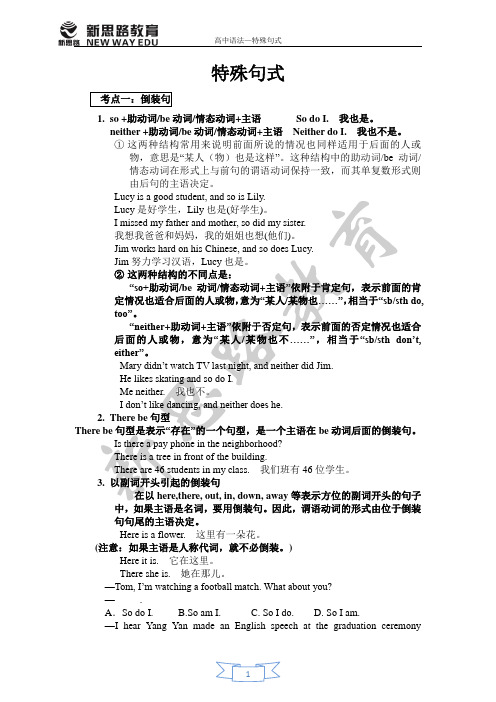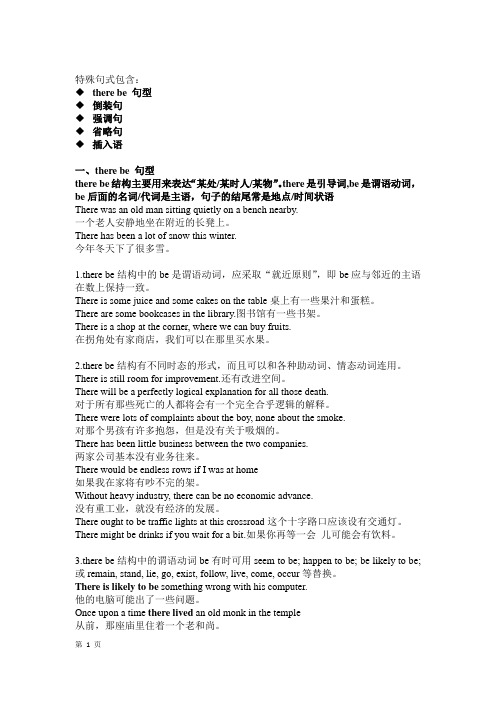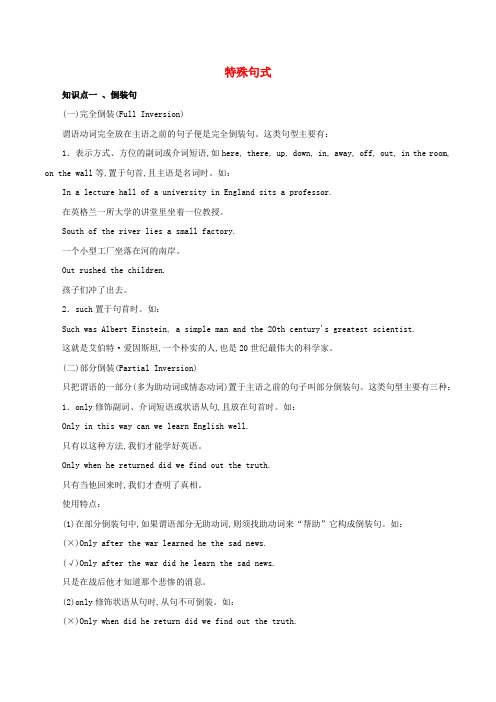高考英语特殊句式经典讲解
(完整版)高考英语特殊句式经典讲解.docx

英特殊句式1.句: It be⋯接that/who其它1.去掉句型后,仍完整。
2.可以,主,,状。
3.状,常含有介,接用 that.4.部分含有定从句。
5.与 not ⋯ until状合, not 和 until 在句中挨着。
6.句的特殊疑形式;疑⋯be.. it..that.. ,序考7.句的特殊疑形式,若在从句中,疑⋯ it..be ⋯ that8.构的省略形式,即被部分后的省略。
9.do(does, did,)用在原形前意必,确。
(只能用于一般式的肯定句 )(1) They couldn ’t say ___it was _____troubled them.A. what; thatB. what, whatC. that whatD. what who (2) It is not who is right but what is right _____ is of importance.(3) It was in China ____Tom first met Mr. Lin.(4) It was ____back home after the experiment .A. not until midnight did he goB. until midnight that he didnC. not until midnight that he wentD. until midnight when he didn’ t go ’t go(5) ---Where did you get to know her ?---It was on the farm _____we worked .A. thatB. thereC. which D .where2.倒装1.与之相的是述;若使用倒装,在句子中会出某些迹象2.种 :完全倒装,(提前);部分倒装(助提前)。
3. 完全倒装:( 1)表示地点的介短在句首;( Vi sit ,live , stand , come , run )( 2)副 in , out,up, down, away, off 在句首,(若主是人称代,不倒装)。
高中英语---特殊句式全面讲解及练习(含问题详解)

高中英语语法讲义第二讲——特殊句式倒装句通常句式为自然语序“主语+谓语”,有时为了强调句子的某一部分,或者出于词汇用法、语法结构或修辞上的需要,将这种比较固定的语序加以颠倒,就形成了倒装。
分为完全倒装,部分倒装和形式倒装。
一.完全倒装:谓语动词完全置于主语之前,主语为名词不为代词,谓语不用进行时。
1.一些表示地点、时间或方位等的副词或介词短语。
如:here, there, now, then, up, down ,in, out,away, off, in the room, on the wall等置于句首。
Down came the rain and up went the umbrella.Then followed three days of heavy rain.Out rushed the children laughing loudly.Away flew the plane.2.such 位于句首。
Such was Albert Einstein, a simple man and the 20th century’s greatest sc ientist.注:此句型中的such多被认为是表语,所以such后的be动词应与其后真正的主语保持一致。
Such are the facts; no one can deny them.二.部分倒装:只把谓语的一部分(助动词,情态动词或be动词)置于主语之前1.so+ be 动词/ 助动词/ 情态动词+主语,意为“...也是如此”。
They love making lots of friends; so do I.2.neither/nor+ be动词/助动词/情态动词+主语,意为“...也不这样”。
Lily can’t ride a bicycle; neither/nor can Lucy.3.否定词never, seldom, nor, not, little, hardly, scarcely等或表示否定意义的介词短语at no time,under/in no circumstances, in no case, by no means, on no condition 等置于句首时。
特殊句式讲解

特殊句式1.so +助动词/be动词/情态动词+主语So do I. 我也是。
neither +助动词/be动词/情态动词+主语Neither do I. 我也不是。
①这两种结构常用来说明前面所说的情况也同样适用于后面的人或物,意思是“某人(物)也是这样”。
这种结构中的助动词/be动词/情态动词在形式上与前句的谓语动词保持一致,而其单复数形式则由后句的主语决定。
Lucy is a good student, and so is Lily.Lucy是好学生,Lily也是(好学生)。
I missed my father and mother, so did my sister.我想我爸爸和妈妈,我的姐姐也想(他们)。
Jim works hard on his Chinese, and so does Lucy.Jim努力学习汉语,Lucy也是。
②这两种结构的不同点是:“so+助动词/be动词/情态动词+主语”依附于肯定句,表示前面的肯定情况也适合后面的人或物,意为“某人/某物也……”,相当于“sb/sth do,too”。
“neithe r+助动词+主语”依附于否定句,表示前面的否定情况也适合后面的人或物,意为“某人/某物也不……”,相当于“sb/sth don’t,either”。
Mary didn’t watch TV last night, and neither did Jim.He likes skating and so do I.Me neither. 我也不。
I don’t like dancing, and neither does he.2.There be句型There be句型是表示“存在”的一个句型,是一个主语在be动词后面的倒装句。
Is there a pay phone in the neighborhood?There is a tree in front of the building.There are 46 students in my class. 我们班有46位学生。
高考英语语法特殊句子汇总

高考英语语法特殊句子汇总高考英语语法是考生必须要掌握的重要内容之一。
在高考英语中,语法的正确运用可以帮助考生提升阅读理解、完形填空、短文改错和写作等题型的得分。
其中,特殊句子是语法中的一个重点。
下面将详细介绍一些高考英语中常见的特殊句子及其用法。
一、倒装句1. 全部倒装句:主语位于谓语动词之后,常用于表示否定、条件、半倒装和祝愿等情况下。
例句:Not only does he study hard, but also he helps others.2. 部分倒装句:谓语动词前的助动词、系动词或情态动词放在主语之前,常用于表示祝愿、建议、要求、命令和表语从句的应该、能够等情况下。
例句:Little did I know about the difficulties they were facing.二、强调句1. 强调句的基本结构为“It is/was + 被强调部分 + that/who + 句子的其他部分”,常用于对某个人、事物或情况进行强调。
例句:It was in the park that I met my old friend.2. 对特定词进行强调时,使用特殊的结构“it is/was + 被强调部分 + (who/that) + 其他成分”,常用于对时间、地点、原因和方式等进行强调。
例句:It was because of his help that I finished the project on time.三、虚拟语气1. 条件句中的虚拟语气:表示与事实相反的假设,条件从句用过去完成时,主句用“would/could/should/might + have + 过去分词”的形式。
例句:If I had studied harder, I would have passed the exam.2. 虚拟语气在宾语从句中的应用:表示愿望、建议、要求等,表达方法为:should + 动词原形,或动词原形前加动词的一般过去式。
高考英语专题十三特殊句式

特殊句式包含:◆there be 句型◆倒装句◆强调句◆省略句◆插入语一、there be 句型there be结构主要用来表达“某处/某时人/某物”。
there是引导词,be是谓语动词,be后面的名词/代词是主语,句子的结尾常是地点/时间状语There was an old man sitting quietly on a bench nearby.一个老人安静地坐在附近的长凳上。
There has been a lot of snow this winter.今年冬天下了很多雪。
1.there be结构中的be是谓语动词,应采取“就近原则”,即be应与邻近的主语在数上保持一致。
There is some juice and some cakes on the table桌上有一些果汁和蛋糕。
There are some bookcases in the library.图书馆有一些书架。
There is a shop at the corner, where we can buy fruits.在拐角处有家商店,我们可以在那里买水果。
2.there be结构有不同时态的形式,而且可以和各种助动词、情态动词连用。
There is still room for improvement.还有改进空间。
There will be a perfectly logical explanation for all those death.对于所有那些死亡的人都将会有一个完全合乎逻辑的解释。
There were lots of complaints about the boy, none about the smoke.对那个男孩有许多抱怨,但是没有关于吸烟的。
There has been little business between the two companies.两家公司基本没有业务往来。
There would be endless rows if I was at home如果我在家将有吵不完的架。
高考英语专题课件 专题10 特殊句式

6.用重复来表示强调: Why!why!The cage is empty! 啊!啊!笼子是空的! They walked for miles and miles. 他们走了好多英里。 7.用倒装句(也就是将要强调的句子或被强调的部分置于句
首)来加强语气: On the table were some flowers.桌上摆着一些花。(强调地
(4)方向副词位于句首时,若主语是名词,主谓须倒装;若主 语是代词,主谓不倒装。例如:
Down came the old man. Away they went.
5.地点副词 here,there 和时间副词 now,then 位于句首 时,若主语是名词,主谓须倒装;若主语是代词,主谓不 倒装。例如:
locked the door.
特别提醒:如果从句中的谓语动词是过去式,则 if 不能省略, 主谓部分也不倒装。
三、省略句 1.简单句中的省略 简单句中的省略包括对话,祈使句,感叹句,独立主格结构
中以及不定式中的省略。不定式的省略有如下几种: (1)用于 expect,forget,hope,intend,like,love,mean,
3.用 ever,never,very,just 等副词和 badly,highly, really 等带有ly的副词来进行强调:
He never said a word the whole day.一整天,他一句话也没 说。
I really don't know what to do next.我的确不知道下一步该做 什么。
Child as he was,he knew a great deal.(child 前不可加不定 冠词)
Much as I like the film,I don't want to see it a second time. Try as you might,you will fail to persuade him out of the
高考英语二轮复习特殊句式考点讲解含解析

特殊句式知识点一、倒装句(一)完全倒装(Full Inversion)谓语动词完全放在主语之前的句子便是完全倒装句。
这类句型主要有:1.表示方式、方位的副词或介词短语,如here, there, up, down, in, away, off, out, in the room, on the wall等,置于句首,且主语是名词时。
如:In a lecture hall of a university in England sits a professor.在英格兰一所大学的讲堂里坐着一位教授。
South of the river lies a small factory.一个小型工厂坐落在河的南岸。
Out rushed the children.孩子们冲了出去。
2.such置于句首时。
如:Such was Albert Einstein, a simple man and the 20th century's greatest scientist.这就是艾伯特·爱因斯坦,一个朴实的人,也是20世纪最伟大的科学家。
(二)部分倒装(Partial Inversion)只把谓语的一部分(多为助动词或情态动词)置于主语之前的句子叫部分倒装句。
这类句型主要有三种:1.only修饰副词、介词短语或状语从句,且放在句首时。
如:Only in this way can we learn English well.只有以这种方法,我们才能学好英语。
Only when he returned did we find out the truth.只有当他回来时,我们才查明了真相。
使用特点:(1)在部分倒装句中,如果谓语部分无助动词,则须找助动词来“帮助”它构成倒装句。
如:(×)Only after the war learned he the sad news.(√)Only after the war did he learn the sad news.只是在战后他才知道那个悲惨的消息。
高考英语复习语法知识专题讲解16---特殊句式(解析版)

高考英语复习语法知识专题讲解专题十专题十六六 特殊句式一、强调句易错点it 强调句强调主语,主语为人时,that 可换成 who:It is/was+王语+that/who+其他成分It was my father that/who did the experiment in the lab yesterday evening.It was we that/who arrived there first,though we went a wrong way.强调宾语,宾语为人时,可用that/who: It is/was+宾语+that/who+其他成分It was the experiment that my father did in the lab yesterday evening.It was his sister that/who Tom met at the school gate yesterday.强调时间状语:It is/was+时间状语+that+其他成分It was on Monday night that all this happened.It was yesterday that Tom met his sister at the school gate.强调地点状语:It is/was+地点状语+that+其他成分It was at the school gate that Tom met his sister yesterday.It was in the store that my father bought the cake.it 强调句的一般疑问句:Is/Was it+被强调部分+that+其他成分? Was it Lucy that phoned just now?Was it last year that the building was completed? it 强调句的特殊疑问句:疑问词(被强调部分)+is/was it+that+其他成分? Why was it that you didn't attend the meeting? How was it that he went to school?强调主语从句:It is /was+主语从句+that+其他成分It was what he said at the party that made her so angry.强调状语从句:It is/was+状语从句+that+其他成分 It was only when I reread his poem that I began to appreciate its beauty.not until 句型中的强调:It was not until 12 o'clock that he went to bed.It is/was+not until...+that+其他成分It was not until the last operation was finished thatBethune left the battle hospital.强调句型的判断方法:将句中的It is/was和that/who去掉,如果句子意义和结构仍完整就是强调句,否则就不是It was three years ago that he went to America for a further study.(强调句)It is the best film that I have seen.(定语从句)对时间、地点或原因状语从句强调时只用 that, 不用 when, where, why It was because it rained heavily that they didn't go swimming.对谓语动词的强调助动词do, does, did 用在动词原形前,用来对谓语动词进行强调Do come here tomorrow.He does study hard.其他强调句......the very+名词At the very minute,the door opened.反身代词I saw it myself when the accident happened.ever, even, just, indeed, only, right等副词+被强调部分I just can't believe my eyes.Why ever/What ever/When ever 等+do/be+主语+其他部分?What ever is the matter with you?What...is/was... What I am going to tell you is that you are alreadyadmitted to Beijing University.强调词+助动词+主谓+其他成分Never have I seen such a strange person.二、倒装句易错点部分倒装not, few, never, hardly, little, seldom,rarely, by no means, in no way, in no case,at no time, under no circumstances等否定意义的副词或短语位于句首时,句子部分倒装Never in my life have I seen such a thing.Seldom does he come back on Sundays.not only...but(also)...连接两个分句置于句首时,not only分句用部分倒装Not only is he interested in football but also he plays itwell.no sooner...than, hardly/ scarcely ...when...结构中,no sooner/hardly/scarcely 置于句首时,主句用部分倒装,且多用过去Hardly/Scarcely had he fallen asleep when a loud knockat the door awaked him.No sooner had I reached the station than the train完成时,than/when后的句子多用一般过去时moved.not...until结构中,not until 置于句首时,主句用部分倒装Not until his mother came back did he finish his homework.副词only+状语(介词语、副词、状语从句)置于句首时,句子部分倒装Only then did I realize the importance of learning English.Only after he came back was I able to see him.so/such...that 句型中,so/such... 置于句首时So moved was she that she could not say a word.So hard does he work that he has made great progress in English.as/though 引导让步状语从句时,常把名词、形容词、副词、动词原形移到as/though 之前;如果作表语的是单数可数名词,要省略冠词Young as/though I am, I have made up my mind to become what I want to be when I grow up.Child as/though he is, he has to make a living.so, neither, nor置于句首,表示前面的情况也适用于另一人或物时I have never been to Guangzhou University, neither/nor has he.She has finished her homework, so has her brother.完全倒装up, down, out, in, away, off等表示地点方位的副词或there, here, now,then等置于句首时,若主语是名词用全部倒装,若主语是人称代词,则不倒装Here are some registered letters for you.In came a man with a white beard.Here he comes.表示地点的介词短语置于句首时,且谓语动词为be, lie, live, sit, hang, remain,stand, exist等表示“存在”的不及物动词时On top of the mountain stands an ancient temple.At the foot of the hill lies a beautiful lake.In a lecture hall of a university in England sits aprofessor.主、系、表结构中的表语置于句首时Present at the meeting were Mr.Li and many otherofficers.Gone are the days when we used the foreign oil.直接引语的一部分位于句首时"Exactly",said the father,shaking the old friend's hands.三、省略句易错点省略主语(You)Open the door, please.简单句的省略省略主谓或主谓的一部分(Is there)Anything else?(You come)This way please. 省略宾语-Do you know Tom?-I don't know(him).省略表语-Are you hungry?-Yes, I am(hungry).并列举的省略后一分句可以省略与前边分句相同的部分To some life is pleasure, and to others(life is)suffering.名词性从句的省略宾语从句中连接词that可以省略,and连接两个或两个以上的that从句时,只能省第一个thatI hope(that)you can come.I hope(that)you can come and that you can help me. think/believe/suppose/expect/hope+so/not 结构的省略-Is she coming?-I believe so/not.which, when, where, why 和 how 引导的宾语从句可以省略全部或部分内容,但引导词不能省略I know there will be a football match but I don't knowwhen(the football match will begin).定语从句中的省略作宾语的关系代词that, which, whom常省略Is this the reason (that)you explained at the meeting foryour carelessness?状语从句中的省略状语从句的主语与主句的主语一致,且从句中的谓语动词有be时,可以省略从句的主语和beWork hard when(you are)young, or you'll regret.当状语从句的主语为it,谓语动词含有be 动词时,可以省略it和beUnless(it is)necessary you'd better not drive so fast.在if so/not, if any, if ever, ifnecessary/possible 等结构中You can use my car, if(it is)necessary.虚拟语气中的省略虚拟条件句中省略if, 把were, had,should 提前Were I you, I would accept the invitation.不定式作love, like, hope, wish, prefer, You can do the work this way if you would like to(do不定式的省略mean, refuse, expect等动词的宾语时,只保留不定式符号tothe work).不定式作allow, ask, tell, advise, force,want 等的宾补时If he doesn't want to go there, don't force him to(gothere).不定式作happy, glad, ready, willing,eager等词的状语时-Could you mind looking after my cat?-Not at all. I would be happy to(look after your cat). 不定式符号to后为 have 或be 时,要保留 have 或 be-Are you a teacher?-No, but I want to be(one)固定结构中的省略be able to, be going to, ought to, have to,used to 等I don't go swimming now but I used to(go swimming). 2021高考英语语法高考英语语法【【特殊句式特殊句式】】易错点对点训练30题I.高考真题诊断·单句语法填空1. The professor warned the students that on no account _______(they, should) use mobile phones in his class.2. China's approach to protecting its environment while _______(feed)its citizens"offers useful lessons for agriculture and food policymakers worldwide,"says the bank's Juergen Voegele.3. It was when I got back to my apartment _______ I first came across my new neighbors.4. Not until recently _______ they encourage the development of tourist-related activities in the rural areas.5. Bach died in 1750, but it was not until the early 19th century _______ his musical gift was fully recognized.1. should they 解析:句意:那位教授告诫这些学生,他们绝对不应该在他的课上使用手机。
- 1、下载文档前请自行甄别文档内容的完整性,平台不提供额外的编辑、内容补充、找答案等附加服务。
- 2、"仅部分预览"的文档,不可在线预览部分如存在完整性等问题,可反馈申请退款(可完整预览的文档不适用该条件!)。
- 3、如文档侵犯您的权益,请联系客服反馈,我们会尽快为您处理(人工客服工作时间:9:00-18:30)。
英语特殊句式1.强调;It be…连接词that/who其它1.去掉句型词后,仍完整。
2.可以强调,主语,宾语,状语。
3.强调状语时,常含有介词,连接词用that.4.强调部分含有定语从句。
5.与not… until时间状语综合,not和until在强调句中紧挨着。
6.强调句的特殊疑问形式为;疑问词。
be.. it..that.. ,语序问题考查7.强调句的特殊疑问形式,若在宾语从句中呢,疑问词。
it..be…that8.强调结构的省略形式,即被强调部分后的省略。
DO(does, did,)用在动词原形前; 务必,确实。
<只能用于一般式的肯定句><1> They couldn’t say ___it was _____troubled them.A.what; thatB.what, whatC. that whatD.what who<2>It is not who is right but what is right_____is of importance.A.whichB.itC.that D .this<3>.It was in China ____Tom first met Mr.Lin.A.thatB. HowC. whichD.where<4>.It was ____back home after the experiment .A. not until midnight did he goB.until midnight that he didn’t goC.not until midnight that he wentD.until midnight when he didn’t go<5>Where did you get to know her ? It was on the farm _____we worked .A. thatB.ThereC. which D .where2.倒装1.它相反的一面,则是陈述;若使用倒装,在句子中会出现某些迹象2.种类:完全倒装,(谓语提前);部分倒装(助词提前)。
3. 完全倒装:<1>表示地点的介词短语在句首时;(谓语为Vi sit ,live , stand , come , run )<2>.副词in , out, up, down, away, off 在句首时,(若主语是人称代词时,不倒装)。
<3>There be句型,要完全倒装。
(Be动词可换为live , stand, lie, seem, happen, come,Appear, remain )4.部分倒装<1>否定词在句首时。
(后面部分不能再出现否定词)常见否定词如下:Never , seldom, little, hardly, scarcely, barely, by no means, under no circumstance<2>.以only +副词(介词短语,从句:正常语序。
)在句首时;<3>so/such….that句型中,若so/such提到句首时,该部分倒装;(但that部分不倒装)。
<4>.虚拟条件句中,省略if,提前were ,had, should.<5>.so, / neither, / nor +倒装语序,(表示“也适应”)<6>.as/though引导的状语从句,要倒装。
<7>.not only….but also 前倒后不倒;not until…部分不倒装,后面的部分倒装。
(1).So absorbed___________ in her work that she didn’t realize I was behind her.A. did sheB. was sheC. she didD. she was(2)No sooner________ begun to speak_________ I sensed that something was wrong.A. he has; whenB. he had; thanC. had he; thanD. did he; when(3)Only when ___________ possible to settle the problem.A. does the chief editor come will it beB. the chief editor comes will it beC. does the chief editor come it will beD. the chief editor comes it will be. (4).___________from the tenth floor when the policeman pointed his gun at him.A. Jumped down the murdererB. Down jumped the murdererC. Down the murderer jumpedD. Down did the murderer jump(5).___________, he does get angry with her sometimes.A. As he likes her muchB. He likes her muchC. Though much he likes herD. Much as he likes her(6).In recent years travel companies have succeeded in selling us the idea that the further wego,__________.A. our holiday will be betterB. the better our holiday will beC. our holiday will be the betterD. the better will our holiday be(7).Hardly___________ when the bus suddenly pulled away.A. they had got to the bus stopB. they got to the bus stopC. did they get to the bus stopD. had they got to the bus stop省略<1>限制性定语从句中,引导词作宾语,可省略。
<2>.when, while, as, if, unless, although, though, until, once, whether等连接状语从句中,常省略跟主句相同主语和be动词。
They just carried out the order as told.<3>.两个(以上的)不定式不定时并列,后面的to省略。
<4>.不定式作感官动词,使役动词的宾补时省略to.I saw him enter the classroom yesterday.<5>.介词but的前面有do时,后面的不定式省略to.即前有do,后无to.(1).______________, I would have phoned you.A. If I knew itB. Had I known itC. If I know itD. Did I know(2).---What do you suppose made her look so unhappy?---__________ her wallet.A. LoseB. LostC. LosingD. Because of losing(3). When___________ into the machine, the water soon changed into ice.A. takenB. takingC. to be takenD. to take(4).---I got tired of the village life here.---Why____________ for a few weeks?A. don’t come to my home C. not coming to my homeC. do you come to my homeD. not come to my home(5).---You performed so well. Are you an actor?---No, I’m not. But I___________.A. usedB. used toC. used to beD. was used to(6).. How is it that you are late for class again?---____________.A. By bus and then on footB. Because I missed the busC. Yes, it’s quite wrongD. It’s far from school祈使句<1>以动词原形开头,省略了主语you,其否定在它前面加Don’t.<2>反意疑问句一般为will you ?但是Let’s….开头要用shall we ?<3>.句型:祈使句+连词+陈述句;与分词作状语的区别,在于有没有连词and /or .<4>.名词短语可以代替祈使句部分。
<5>.该句型连词前不能是非谓语那三种形式,也不能是If条件句。
<6>.有时侯祈使句与连词间可能有插入语,完全可以去掉它。
(1)._______and I will get the work finished.A.Have one more hour C. Given one more hourB.One more hour D. If I have one more hour解析:据and为连词,其前后须为句子或与句子相当的部分,可排除后两项,好像A项正确,但是祈使句省略了主语You ,前后不和逻辑故答案为B.(2).You can go to the party with us if you _______A.want toB. Want to do C . want it D. want to go(3).What makes you so worried ? _________A.Because of my weight B .I’ve put on some weightC .That I’m putting on weight D.Because I ’ve put on weight(4). What are you busy with ?The conference ____in our city next week , as you know.A.will be heldB.heldC. be holdingD.to be held答案:1-5A C A C D; 1-7BCBBD,BD 1-6BCADBB1-4. BACD。
